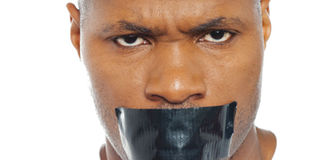Who gagged our fabled journalism?

A compromised watchdog: You do not have to be an opportunistic foreign journalist to realise that the Kenyan media is not only in bed with the Government, but is also living in a make-believe world where milk and honey flow from diamond-encrusted faucets built by the gods themselves
What you need to know:
- As a matter of fact, the impact of our work is nowadays not measured by how much it has helped change the lives of Kenyans, but by the number of awards it has won.
Early last week, I was asked by a local television journalist if ever there was a person who was as cynical of local journalists as I was.
Call it deliberate memory loss, but I purposefully refuse to remember what remark I had made to elicit that question.
In reply, though, I told him that my cynicism was informed by the fact that I know us, the journalists, the media. I know our strengths and shortcomings in equal measure and I am not afraid to point them out when paeans are sung in our honour or when invectives are hurled at us.
There was no further exchange and I have no idea whether my inquisitor was satisfied or not, but what he did not know was that, for quite some time, I have been asking myself what it is that makes me, us, Kenyan journalists, so fickle, so feeble-minded, so narcissistic that we think the sun rises out of our bedrooms.
If ever there were an exemplification of the Biblical phrase “many were called but few were chosen”, we are it. We are the untouchables, the sharpest pens in the drawer, the best brains that ever came out of Africa.
We cannot stand being told to change direction even when we have been blindfolded by the Government and are being pushed in to an abyss.
You do not have to be an opportunistic foreign journalist to realise that the Kenyan media is not only in bed with the Government, but is also living in a make-believe world where milk and honey flow from diamond-encrusted faucets built by the gods themselves.
The accusations that we numbed ourselves with messages of peace, slept on the job, censored ourselves or preached peace at the expense of justice during the recent elections are neither here nor there. After all most, if not all, of our investments, kith and kin are in this country and we had to employ all means to protect them.
But by numbing ourselves with messages of peace and censoring ourselves, we were just admitting that, ever since the “hostilities” ended in 2008, there has never been peace, that what we have had is just a tinderbox waiting for the smallest spark to explode.
By censoring ourselves, and, by extension, the people, we were conspiring with the Government to hide the fact that, through its lopsided resettlement and compensation schemes, it had failed to foster peace among different communities since the chaos of five years ago.
Instead of being a watchdog, the media has turned into a partner, a collaborator of the Government, a feat which the latter achieved — knowingly or inadvertently — by continuously heaping praises on the former as was witnessed during the recent elections, or with semi-autonomous Government bodies incessantly dishing out awards to the media, so much so that our work is nowadays not for viewers, listeners or readers, but for media awards panelists.
As a matter of fact, the impact of our work is nowadays not measured by how much it has helped change the lives of Kenyans, but by the number of awards it has won.
It is, therefore, not uncommon for journalists to say they are working on stories to be submitted for different awards, or for them to take to the social media and start remarking how a story is so going to win an award even before all of it is aired.
Of course there is nothing wrong with winning awards, aiming to win awards or even being ambitious, but when you are blinded by personal gain and bias and the urge to be ahead of an imagined competition as opposed to informing and educating the public, then you lose focus.
Let us not lie to ourselves, we are doing this country more harm than good and we are not becoming better professionals by continuously patting ourselves on the back, sometimes literally, during live news broadcasts or by attacking those who point out our shortcomings.
We are so fast in casting stones at others but we lack the wherewithal to look within and see that the reports by foreign journalists say more about our low level of understanding of the world around us than about their high standards of journalism, considering that they are called upon and paid more than double our yearly wage to train us for less than a month.
For all the noise that we make about our professionalism and independence, we have never remembered that we do not even have a professional media body or a Press Club where we can meet and share ideas or compare notes.
I will not write anything about the Editors’ Guild, Media Council of Kenya and Media Owners Association.
Good people, we are fast becoming the laughing stock of the developing world and if we ever want to be relevant in the 21st Century, then what we need is not to be regulated — either by the Government or ourselves — but major reforms, otherwise the next war will start in our newsrooms.




